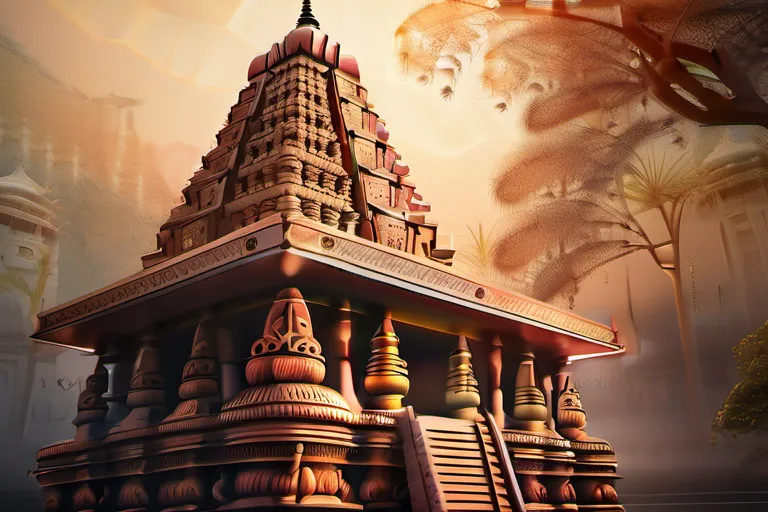Explore the fundamental principle of karma in Hinduism, its origins, and its impact on daily life.
Karma is a central teaching in Hinduism that explains the cycle of cause and effect. This article provides an overview of this ancient concept and its significance in Hindu philosophy.
The Origin and Evolution of Karma
The concept of karma, a central teaching in Hinduism, has its roots deeply embedded in ancient India. But how did it all begin? Wasn’t there always this idea of cause and effect? In reality, the origins of karma are shrouded in legend and myth, but historians and scholars suggest that the concept evolved over centuries, possibly starting with Vedic hymns and the Upanishads. These texts hinted at a divine justice where actions had consequences, setting the stage for what would later become a complex philosophical system.
Imagine the world as a vast garden, where every action you take is like planting a seed. Over time, these seeds grow into fruits that eventually ripen and return to you. This simple analogy captures the essence of karma—your actions shape your destiny. The evolution of this idea from early Vedic concepts to more sophisticated philosophical discussions in later texts reflects a journey of understanding and self-reflection.
The Bhagavad Gita, a part of the epic Mahabharata, offers another profound insight. In this text, Arjuna is given guidance on his duties through a dialogue with Krishna, emphasizing that actions should be performed without attachment to their outcomes. This teaching not only enriches our understanding of karma but also introduces the idea of performing one’s duty without craving for results.
Over time, various schools of Hindu philosophy further developed and refined the concept of karma. From Samkhya’s dualism to Vedanta’s monistic approach, each school offered its unique perspective on how karma operates in the universe. But at its core, the idea remains timeless—your actions today will shape your tomorrow.
The Principles of Karma
Now that we’ve explored the origins and evolution of karma, let’s delve into its practical application in daily life. At the heart of Hinduism lies the concept of karma, which is more than just a set of rules; it’s a fundamental teaching about cause and effect, action and reaction, in this life and beyond.
Imagine karma as a vast network of invisible threads, each thread representing an action or thought. These threads are interconnected, weaving through time and space, linking our past to the present and future. The three main principles of sanchita, prarabdha, and kriyamana help us understand how karma operates within this intricate tapestry.
Sanchita Karma is like a huge burlap sack filled with countless grains, each one representing past actions. These actions are stored in the karmic repository, ready to be reaped at an appropriate time. It’s the sum of all our deeds from previous lives and current life experiences that have yet to bear fruit.
Prarabdha Karma, on the other hand, is like a handful of these grains that are ready to be harvested now. These are the actions from sanchita karma that have manifested into tangible experiences in our present life. They dictate our current circumstances and challenges, shaping who we are at this very moment.
Kriyamana Karma is the ongoing process of planting new seeds in the garden of life. Our daily actions and thoughts shape what will grow in the future. It’s like tending to a garden; every action you take today will determine whether your efforts bear good or bad fruits tomorrow.
The interplay between these three forms of karma creates a dynamic system that guides us through our lives, urging us to be mindful of our actions and their consequences. By understanding this intricate dance, we can navigate life’s challenges with greater wisdom and purpose. After all, in the grand cosmic garden of karma, every action is both a flower and a seed, waiting to bloom or wither based on how it’s tended.
Karma and Reincarnation
Have you ever wondered why some people seem to have it all while others struggle through life’s challenges? In Hinduism, this enigma can be explained by the intertwined concepts of karma and reincarnation. These principles form the backbone of the cyclical nature of existence in Hindu philosophy. How do they work together to shape our lives?
Karma is often described as a cosmic law that ensures every action has consequences, good or bad. But how does this connect with reincarnation? Imagine life as a vast ocean where each soul is a little boat. Our actions on the surface of this ocean create ripples that determine our journey and destination. These ripples are akin to karma, guiding us through successive lifetimes until we reach enlightenment.
Reincarnation, or samsara, is the process by which souls are born again into new bodies after death, depending on their accumulated karma. This cycle of birth, death, and rebirth can be likened to a never-ending game of snakes and ladders, where the number of ladders represents our good deeds leading us towards liberation or moksha, while the snakes symbolize negative actions pulling us back into lower realms.
The relationship between karma and reincarnation is symbiotic. Good karma propels you forward on your spiritual journey, potentially bringing you closer to moksha in this life or a future incarnation. Conversely, bad karma can trap you in a cycle of suffering, forcing you to return to earth until the balance is restored.
Understanding these concepts opens up a profound perspective on our actions and choices. It challenges us to consider the long-term impacts of our decisions, not just in this life but potentially in many lives to come. By living with awareness, we can work towards creating positive karma that may ease our journey through samsara or even lead us out of it altogether.
The Role of Karma in Daily Life
How do our daily choices and actions shape our lives? Have you ever wondered why some people seem to have smooth paths, while others face constant challenges? Enter karma, a central teaching in Hinduism that provides profound insights into these questions. Karma is like the invisible thread that weaves through every moment of our existence, influencing not just our current experiences but also our future ones.
Imagine you’re planting seeds in a garden. Just as each seed has its own unique journey to grow and thrive, your actions today can sow the seeds for tomorrow’s outcomes. In this metaphor, karma is akin to the soil that nourishes these seeds. What we plant now determines the quality of our harvest later.
How does karma influence our daily decisions? Every time you choose between right and wrong, every moment you interact with others, every thought you have—these actions are part of your karma. They contribute to a tapestry that shapes who you are and what happens in your life. For instance, if you consistently help others and practice kindness, the threads of your good deeds will create a rich, vibrant fabric of positivity.
But it’s not just about external acts; even our intentions play a role. When we act with true intention—meaning without desire for personal gain or recognition—the impact on our karma can be profound. It’s like choosing to plant flowers simply because they bring joy, rather than expecting a reward in return.
In the end, understanding and embracing karma as part of your daily life can lead to greater mindfulness and intentional living. By making choices that align with positive actions, you can create a cycle where each good deed strengthens the next, leading to a more fulfilling existence. So, what actions will you take today? Will they be like seeds planted in fertile soil, or just scattered on barren ground?
Karma and Morality
Have you ever wondered why some people seem to have it all, while others struggle despite their efforts? Could there be something deeper at play that influences our lives beyond just immediate circumstances? Enter the concept of karma in Hinduism—a central teaching that explores the intricate web of cause and effect that governs our existence. Karma, often misunderstood as simply “what goes around comes around,” is much more profound than that. It’s a complex system that links every action to its consequences, creating an invisible chain that ties our present experiences to our past deeds.
Imagine karma as the unseen architect of your life, subtly shaping your path with each choice you make. Just like planting a seed requires nurturing for it to grow, performing good actions (dharma) nurtures positive outcomes, while negative actions can stifle growth or even set back progress. So, how does this principle influence our daily morality and the decisions we make? Adhering to dharma, or duty, is key. It’s like following a map through life; staying on the path leads to clearer skies ahead.
But why should you follow dharma if you believe in karma? Think of it this way: every choice you make is not just an isolated incident but part of a larger story. By consistently choosing good over evil, you’re contributing to a positive cycle that can ripple through time and space. Conversely, neglecting your duties might lead to negative outcomes, creating a cycle that could be hard to break.
The beauty of karma lies in its adaptability. It’s not a rigid law but a flexible guide that allows for personal growth and transformation. Each action, no matter how small, counts towards either enhancing or diminishing the quality of your life. So, as you navigate through life’s challenges, remember that every decision has an impact—on yourself and on others.
By integrating karma into your daily life, you’re not just following a set of rules but aligning yourself with a cosmic order. This alignment can bring about greater peace, purpose, and fulfillment. The path to a better future begins with each step you take today, guided by the principles of dharma and the wisdom of karma.
The Path to Liberation from Karma
Now that we’ve explored the concept of karma and its connection to morality, let’s delve into the profound journey toward spiritual liberation from this cycle. Have you ever pondered what lies beyond the endless dance of cause and effect? What is the ultimate goal in this intricate web of actions and consequences?
Moksha, or spiritual liberation, stands as a beacon of hope for those seeking to break free from the bonds of karma. It’s like reaching the summit after climbing a mountain; once you achieve moksha, you transcend the cycle of birth and rebirth, escaping the clutches of suffering and sorrow.
So, how does one embark on this path? The ancient sages recommend self-discipline, urging us to live in accordance with dharma—righteousness or duty. By adhering to dharma, we ensure our actions are pure and noble, thus fostering positive karma. Imagine each good deed as a step towards the light; as you ascend, your spirit grows stronger.
Another crucial aspect is meditation and contemplation. Through these practices, one can quiet the mind and gain deeper insights into the nature of reality. Meditation acts like a compass, guiding you through life’s tumultuous waters towards the calm center where true peace resides.
Love and compassion also play a vital role in achieving moksha. By cultivating these virtues, one not only elevates their own soul but also helps liberate others. It’s as if we’re planting seeds of kindness; they may take time to grow, but they will yield abundant blessings.
In summary, the path to moksha involves a holistic approach—balancing actions, meditation, and compassion. Each step, no matter how small, brings us closer to that timeless realm where all karma ceases, and the soul finds eternal peace. Are you ready to take your first step on this transformative journey?
Conclusion
 By understanding karma, we can gain insights into the nature of reality, the purpose of life, and the path to spiritual growth.
By understanding karma, we can gain insights into the nature of reality, the purpose of life, and the path to spiritual growth.











